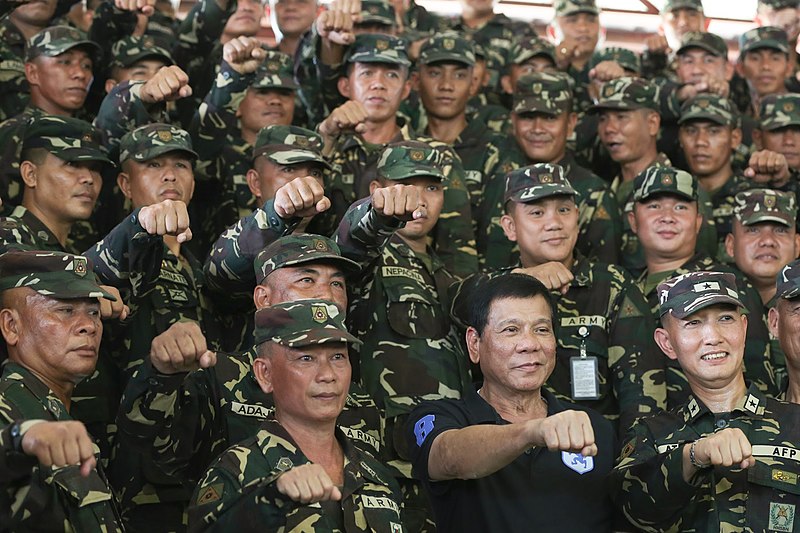
Image: Presidential Communications Operations Office/Wikimedia Commons.
Three years, or halfway, into Philippine President Rodrigo Duterte’s term, both internal and external security concerns remain prominent in the consciousness of the country’s officials and security experts.
Anxiety is particularly acute in the immediate maritime areas: the disputed land features and waters of the South China Sea to the west, and the Sulu and Celebes (Sulawesi) Seas to the south and southwest of the country. In the South China Sea, the main concern has been China’s expansive claim, and developments over the past year point to more trouble ahead over this longstanding issue.
On the positive side, Manila and Beijing have regularly convened a bilateral consultative mechanism that’s exclusively intended for discussion of issues arising from the South China Sea disputes. ASEAN and China continued to work towards a regional code of conduct, making incremental progress on a single draft negotiating text.
However, the incontrovertible facts remain: China has permanently altered the geophysical and security environments in Southeast Asia through its construction and militarisation of artificial islands in the South China Sea since 2014.
China maintains a constant presence near areas occupied by other claimant states, mobilising both civilian and military vessels in assertions of sovereignty and effectively preventing some countries (not only the Philippines but also Vietnam and Malaysia) from undertaking resource exploitation in the disputed areas.
China has also continued to reject the 2016 arbitration ruling that determined many of its actions to be illegal infringements of Philippine maritime rights.
Not only were Chinese actions not restrained by diplomacy or international legal decisions, but it appeared that in the spiralling power competition with the United States (fuelled by trade and technology wars) and domestic power politics in China (where Xi Jinping is driving a deepening of centralised control of his party-state), the Chinese were becoming increasingly nationalistic, ambitious and assertive.
The Philippines–China consultations and ASEAN–China negotiations were intended to be proactive agenda-setters in shaping new directions for relations with China. Yet they may achieve little more than legitimising a new status quo that allows China’s behaviour to go uncontested.
Meanwhile, Duterte remained vocal and resentful of America’s and other countries’ criticism of his human rights record in the war on drugs. However, during a visit to Russia he called the United States ‘a close friend of the Philippines’. He also affirmed that the Philippines continued to uphold the values of freedom and liberalism, signalling that visiting Russia did not signify a break from the West. This was in sharp contrast to his first visit to China in 2016 when he signalled the ‘pivot to China’ by announcing a ‘separation’ from the United States.
On the trade war between China and the US, Duterte explained at the recent ASEAN Summit in Thailand that the Philippines wasn’t taking sides. The independent foreign policy stance was becoming less about a pivot to China and more about diversification of partnerships while strengthening defence capabilities in anticipation of continuing maritime security threats and challenges.
The Philippines’ other major regional security concern is the spread of terrorism and violent extremism. Domestically, peace with the Moro Islamic Liberation Front in Muslim Mindanao seems to have been brought within reach through the establishment of the Bangsamoro Autonomous Region. Of course, immense governance challenges have to be faced to achieve sustainable development and dependable security for this conflict-torn region.
One lesson the Philippines can draw is that failure to contain conflict within one’s own borders creates spill-over tensions and vulnerabilities in relations with neighbouring states.
The defeat of Islamic State in the Middle East resulted in a spike in extremist influence and activity in Southeast Asia. Some fighters are feared to have returned to Indonesia, Malaysia and Singapore, while others sought to continue their jihadist struggle for a caliphate in places where governance has been traditionally weak, including in Muslim Mindanao.
The five-month siege of the city of Marawi in 2017, led by the local IS-affiliated Maute group, demonstrated the fragile conditions in the southern Philippines, as well as the capacity of extremists to wage urban warfare.
Long steeped in counterinsurgency strategies waged in the Philippine countryside, the Armed Forces of the Philippines now faces the challenge of building the capacity to cope with armed conflict in major population centres, and working with like-minded states to break up the regional and transnational criminal networks that feed violent extremism.
Counterterrorism cooperation between the Philippines, Malaysia and Indonesia acquired a strong maritime dimension with the implementation of the Trilateral Cooperative Arrangement in 2016. The three countries conduct intelligence-sharing, coordinated maritime patrols, and joint air missions over an area of common interest in the Sulu and Celebes (Sulawesi) Seas.
The signing of the agreement was followed by a drastic decline in Abu Sayyaf kidnappings . The drop was attributable not to the agreement per se, but to more effective control and prevention of border movements unilaterally imposed by Philippine and Malaysian authorities in their areas of jurisdiction. Nonetheless, the scourge of terrorism can be defeated only through cooperation with neighbouring countries and with others who share this major global concern.
The Duterte government’s promotion of a more diversified and omni-directional foreign policy—including preservation of traditional alliances—may be exactly what is needed to foster the agility that huge uncertainties in the external environment demand.
Ultimately, however, the only reliable guarantee—whether of foreign policy autonomy, territorial integrity, or security against external armed threats and internal destabilising forces—is a government that takes the development of its defence and security capabilities seriously.
[Aileen San Pablo Baviera is a professor at the University of the Philippines and president of Asia Pacific Pathways to Progress. This is an edited version of a chapter in the Regional security outlook 2020, published by the Council for Security Cooperation in the Asia Pacific.] Image: Presidential Communications Operations Office/Wikimedia Commons.
https://www.aspistrategist.org.au/security-woes-will-continue-to-haunt-the-philippines-in-2020/

No comments:
Post a Comment
Note: Only a member of this blog may post a comment.